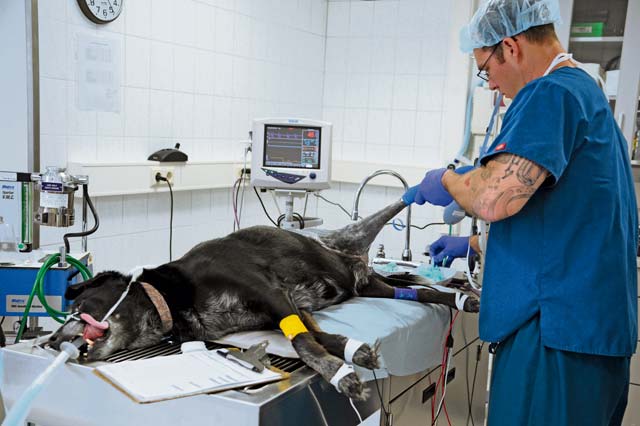
Taking care of those four-legged family members is what the Public Health Command District-Northern Europe, Dog Center Europe, vet clinic on Pulaski Barracks does best.
“We have 19 different veterinary clinics throughout the region,” said Maj. Kent Vince, Dog Center Europe director. “We also serve as a referral hospital for any dogs coming from the Central Command and Africa Command areas of operation, so we routinely receive injured military working dogs from Afghanistan and the Middle East.”
The surgical department provides a variety of surgical procedures for the military working dogs.
“The job we have here is very unique as a veterinary surgeon, getting the opportunity to take care of these world-class animals that are going downrange saving lives,” Vince said. “It’s an honor for us to provide that high-level care to those dogs and dog handlers whom those dogs mean so much to.”
In addition to providing care to the military working dogs, the vet clinic also provides care to pets of service members stationed here.
“We do vaccinations, health certificates, pet passports, in-house blood work, spays and neuters, and much more,” said Sgt. John Snook, PHCD-NE, DCE NCOIC of clinical operations. “We also try to focus on controlling any disease that may be around and to not have them spread further.”
The biggest issue here, especially in the summer, are ticks.
“Owners should be making sure their pets are on flea and tick prevention and have them tested annually for heartworm and tick-borne illnesses,” Snook said. “Pets are a part of service members’ families. Some people don’t have children and their pets are their children, so we take good care of those family members.”
With more than 40 clients a day and 300 to 400 vaccinations in a month, making it the second busiest vet facility overseas, the vet clinic can be a busy place.
“Clients arriving late is an on-going issue, and a lot of times it’s not the client’s fault,” Snook said. “Sometimes gates are closed, so we advise people to plan on arriving 15 minutes early, and if they are late expect to possibly be rescheduled.”
Even being busy on a day-to-day basis, members of the vet clinic find joy in what they do.
“You can’t go around this clinic without seeing some of the cutest dogs,” Snook said. “They have their own attitudes and personalities; the best part is they don’t judge you. If you have a bad day, they don’t care.”
As soon as someone gets here or gets a pet, the first step should be to enroll the pet at the vet clinic.
“They shouldn’t wait until their pets’ vaccinations are due,” Snook said. “Enrollment has to be done before their pet is seen at our clinic.”
The best time to enroll pets is Thursdays between 8:30 a.m. and 3 p.m. During lunch any day is a good time to pick up medications or prescription food.
To schedule an appointment, contact the Dog Center Europe vet clinic at 493-4444 or 0631-340-64444.







